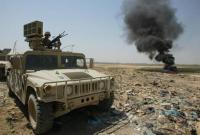Oil Change International has released an startling report today quantifying both the greenhouse gas emissions of the Iraq War and the opportunity costs involved in fighting war rather than climate change.
Here’s a few the interesting (and disturbing) facts found in the report:
- Total US spending on the Iraq war could cover all of the global investments in renewable power generation that are needed between now and 2030 in order to halt current warming trends.
- Just the $600 billion that Congress has allocated for military operations in Iraq to date could have built over 9000 wind farms (at 50 MW capacity each), with the overall capacity to meet a quarter of the country’s current electricity demand.
- In 2006, the US spent more on the war in Iraq than the whole world spent on investment in renewable energy.
Subscribe to our newsletter
Stay up to date with DeSmog news and alerts







